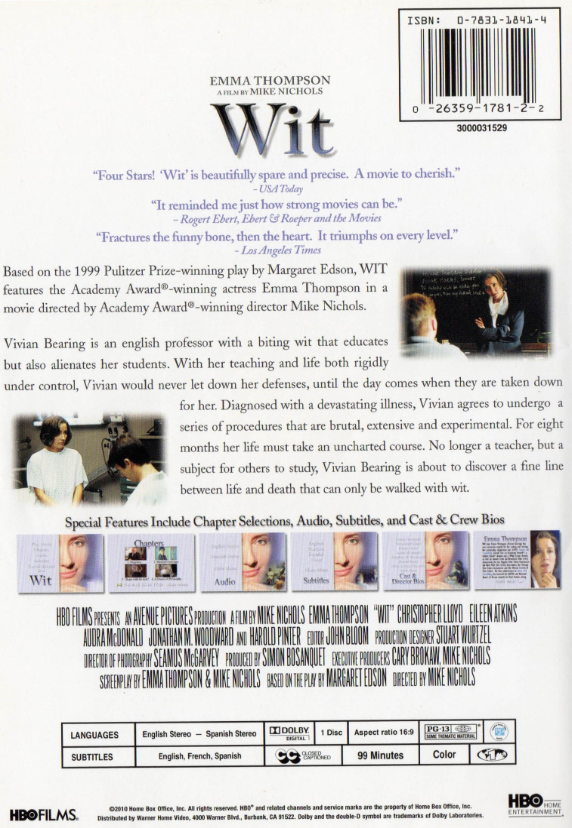Personal, powerful, harrowing, unforgettable, Emma Thompson in one of the best performances we will see this year.
"Wit" is one of the most personal stories of terminal illness that I can remember. Most of the movie takes place behind hospital doors where the film's main character is tested and treated for advanced stages of ovarian cancer-that may be the reason that it was released straight to cable TV instead of getting a much deserved theatrical release. Do not let the depressing themes stop you from viewing "Wit," it is thought-provoking, riveting, unforgettable-one of the best movies of the year.
The film is directed by Mike Nichols (whose most memorable work is the original classic, "The Graduate"). He is at the top of his game here, vividly focused and, working for a script by himself and Emma Thompson, uses a narrative of the first person. The main character, a strict professor of poety in her upper forties named Vivian Bearing, often talks directly to the camera, incorporating a straightforward point of view as she shares her personal feelings directly. This gives the movie a personal dimension, and the soundtrack, consisting of memorable classical music, contributes to the penetrating power of this superb motion picture.
Since the production never had a theatrical release, it will not be eligible for Academy Awards next March. That is a shame, because the work by Emma Thompson is more invigorating, emotional, and involving as anything we are likely to see this year. She delivers a performance of awe-inducing empathy, doing something many actresses would have trouble dealing with. She plays a tough individual, both physically and emotionally, but, as the movie's clear irony proves, even the strongest people have a breaking point, and when she reaches hers, she loses confidence in her past and current strengths. Thompson is heartbreaking and vivid, creating one of the most convincing and noteworthy characters in a long time.
Christopher Lloyd plays Dr. Harvey Kelekian, the person in charge of Ms. Bearing's treatments. It is clear this man is more concerned about the results of the tests then the actual person being tested. Bearing becomes a mere guinea pig, and as she states in one of the movie's most powerful scenes, she is unbearably ill not because he has advanced stages of ovarian cancer, but because she is being treated for advanced stages of ovarian cancer. It is the actual treatments that are a threat to her health. Eileen Atkins plays a sympathetic nurse who sees Bearing as more than just a patient, but a person. Jonathan M. Woodward delivers a powerful performance as another hospital worker more interesting in numbers than people.
"Wit" is a powerful, harrowing movie not to be missed. It aired on HBO about a week ago and will continue running for a while, until finally reaching home video. Check you local TV listing for show times, or wait for the video release. This movie has a place on my list of the top ten movies of the year, and for you to miss such an influential picture would be a crime.
Powerful And Touching Account Of Living And Dying With Cancer
This is a wonderful, must-see film.
Emma Thompson puts on a superb performance as Vivian Bearing (a Professor of English Literature specializing in the poetry of John Donne,) who leads us through the last months of her life in narrative style.
Diagnosed with terminal ovarian cancer, Bearing agrees to experimental treatments involving powerful doses of chemotherapy. As we see her gradually losing her fight, Thompson convincingly portrays her emotional and physical torment and pain. Audra McDonald is well cast as the compassionate nurse (Susan) assigned as Bearing's primary care giver, who tries to ensure that, in the face of the doctors' temptation to continue to use Bearing as a guinea pig for their research, she will be treated with dignity and respect in her last days. John Woodward is quite believable as a young cancer researcher (Dr. Jason Posner) who really seems to see dealing with patients as an inconvenience that takes time away from what's really important to him, and his rather emotionless and awkward interplay with Bearing suits the character perfectly; a testimony to Woodward's talent.
This movie offers a powerful commentary on the cold and rather antiseptic environment of hospitals, in which patients are seen more as learning opportunities than people. The poetry of John Donne, interspersed throughout the movie as a source of strength for Bearing, is well used.
There's very little to criticize about this movie. Christopher Lloyd (cast in a rare serious role as Dr. Kelekian, the doctor in charge of Bearing's case) comes across as a bit flat, but the role is a relatively small one, and this doesn't detract much from the story. I also found the flashback scenes to be a bit distracting, but these have to be seen in context: this movie is based on an original stageplay written by Margaret Edson, and these scenes would look quite natural in that environment. I also thought the movie went on about five minutes too long. The last scene to me was unnecessary. I personally would have liked to have seen the movie end with the touching visit by Bearing's former Professor. We'd been put through the ringer enough, and didn't need the troubling last few minutes. These are just minor quibbles, though, about a truly great movie.
It's powerful, well acted, well put together. It could be disturbing to some people uncomfortable with illness and death, but it is an educational experience just to watch. I give it 9/10.





